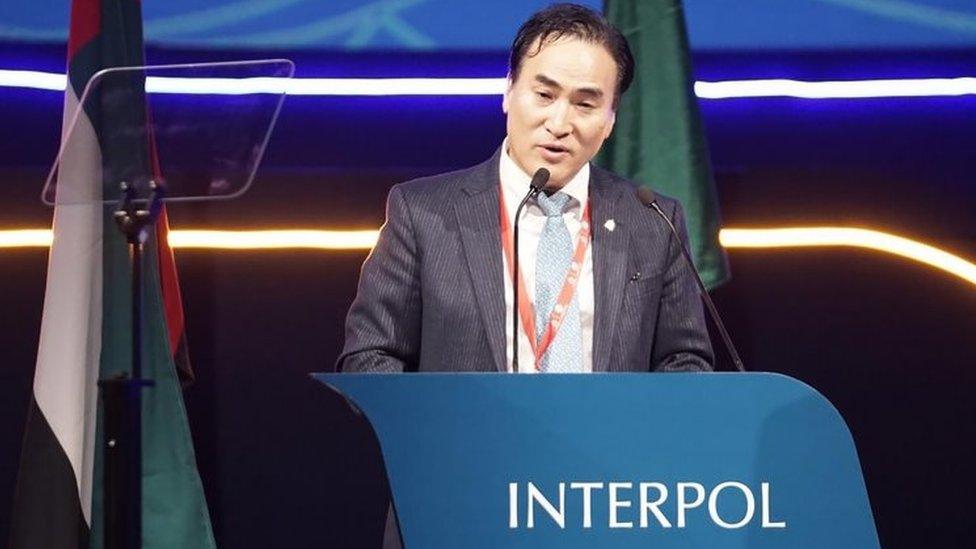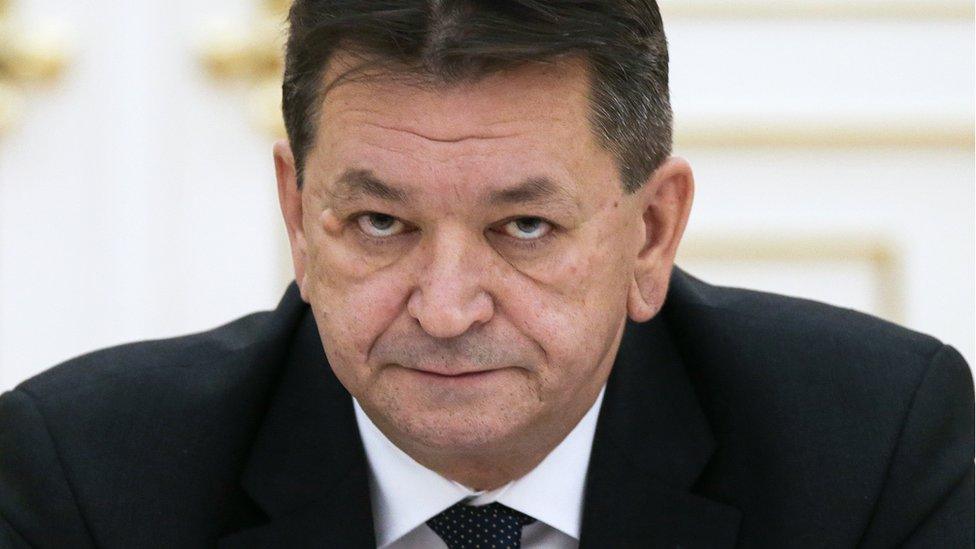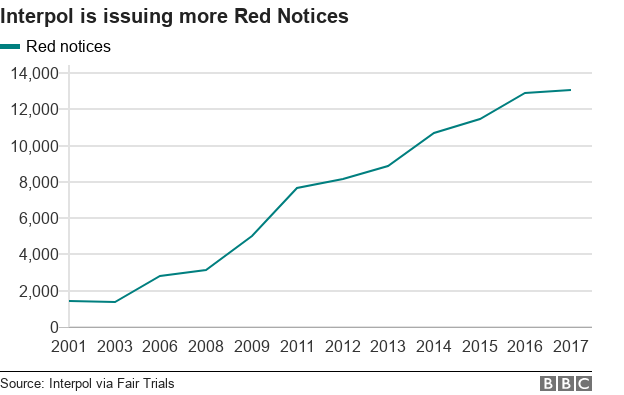Interpol presidency vote: Russia in surprise loss to South Korea
- Published

Kim Jong-yang had been acting Interpol chief since the last president's disappearance in September
Interpol has elected South Korean Kim Jong-yang as its president, rejecting the controversial Russian frontrunner.
Mr Kim was chosen by Interpol's 194 member states at a meeting of its annual congress in Dubai.
He beat Russia's Alexander Prokopchuk, who has been accused of using Interpol's arrest warrant system to target critics of the Kremlin.
Russia blamed the outcome of the voting on "unprecedented pressure and interference".
The election follows the disappearance of Interpol's former president Meng Hongwei, who vanished on a trip to China in September. Beijing has since confirmed he has been detained and is being investigated for allegedly taking bribes.
Who is Kim Jong-yang?
Mr Kim, 57, beat Mr Prokopchuk, also 57, by 101 votes to 61 at Interpol's General Assembly meeting on Wednesday, media reports say.
Interpol confirmed the South Korean's victory,, external without revealing the breakdown of the results.
Mr Kim is a former South Korean police officer who once served as head of police in Gyeonggi, the country's most populous province.
He was already senior vice-president of Interpol and had been serving as acting president since Mr Meng's disappearance. He will serve out the remaining two years of Mr Meng's term.
Although his role as president is largely ceremonial - the day-to-day running of Interpol is led by Secretary-General Jürgen Stock - it does wield influence.
Upon his election, Mr Kim said: "Our world is now facing unprecedented changes which present huge challenges to public security and safety.
"To overcome them, we need a clear vision: we need to build a bridge to the future."
Who is Alexander Prokopchuk?
Mr Prokopchuk is a Russian general who worked for many years with Russia's interior ministry.

Russian Alexander Prokopchuk was widely considered the frontrunner for the post
While he was Interpol's Moscow bureau chief, he was accused of abusing the so-called red notice system - international arrest warrants - to target those who were critical of Russian President Vladimir Putin.
No such accusations have been levelled at him while he has been one of Interpol's four vice-presidents.
Moscow said Mr Prokopchuk would remain an Interpol vice-president representing Europe and "focus on strengthening the position of Interpol in the international police community and increasing the efficiency of the organisation's work".
Who opposed Prokopchuk's candidacy and why?
There had been growing fears among Russian human rights groups and officials from other countries that Moscow would use his position as president to target its political opponents.
A bipartisan group of US senators said electing Mr Prokopchuk would be "akin to putting a fox in charge of the henhouse", while a prominent Kremlin critic said it would be like "putting the mafia in charge".
This prompted a furious response from Moscow, who said such comments amounted to a "certain kind of interference in the electoral process of an international organisation".
Both the UK foreign office and US Secretary of State Mike Pompeo threw their weight behind Kim Jong-yang's candidacy. Lithuania and Ukraine had threatened to withdraw from Interpol if Mr Prokopchuk was elected.
Two British-based prominent critics of the Kremlin - financier Bill Browder and ex-oil tycoon Mikhail Khodorkovsky - say they plan to launch a legal bid to have Russia suspended by Interpol.
Bill Browder: Russian Interpol candidate 'most inappropriate'
Bill Browder, who was held in Spain earlier this year after a Russian Interpol request, has been a thorn in the Kremlin's side, being widely credited with the creation of the Magnitsky Act, a 2012 range of sanctions from the United States on top Russian officials accused of corruption.
He welcomed the rejection of Mr Prokopchuk saying: "Reason prevails in this dark world."
"The clear next step is to suspend Russia from Interpol for its consistent and serial abuse of the Red Notice and diffusion system for political purposes," he added.

How many Red Notices are issued?
By BBC Reality Check team
Most of them are not made public, so tracking is difficult. It's also highly subjective as to whether notices have been issued for only political reasons.
But looking at Interpol's published database on Red Notices, we can draw some interesting insights.
First, of the cases publicly declared by individual countries, Interpol's data shows that 160 individuals are wanted by Russia. This is also the number wanted by the US.
One person is wanted by the UK and 44 by China.

This is not a complete picture as countries can restrict details of the notice to law enforcement.
We do, however, know the total number of notices issued by all countries, and this shows a significant rise over the past decade.
In 2006, Interpol issued fewer than 3,000, according to statistics gathered by Fair Trial (from collated Interpol data), an organisation that campaigns against abuses of Interpol.
The number has steadily increased and in 2017, when Interpol published about 13,000 Red Notices.
There were a total of about 85,000 notices in circulation at the end of 2016.
Countries can also request other colour-coded notices to help locate suspects or warn member countries of criminal activity.

How did Russian media react?
By BBC Monitoring

Kremlin-controlled media said the vote was further evidence of "a veritable information war" against Mr Prokopchuk
The Kremlin-controlled media are casting Mr Prokopchuk's defeat as the victory of a "Russophobic lobby".
A newsreader on national state TV channel Rossiya 1 accused the West of mounting a "veritable information war" against the Russian candidate.
On the country's tightly-controlled daytime political talk shows, the mood was that the vote was yet another example of the wall of hostility apparently encircling Russia.
Presenters stressed that Moscow was in fact not really that interested in the Interpol job, and that this was a fight started out of nothing by its enemies, especially US politicians and the British media.

- Published21 November 2018
